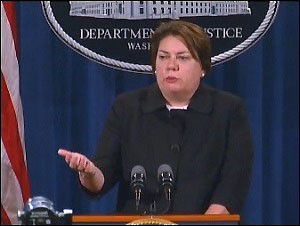U.S. Department of Justice Ignores Citigroup’s Criminal Record

Assistant Attorney General, Leslie Caldwell, Speaking at Press Conference May 20, 2015
When the U.S. Department of Justice held its press conference on Wednesday to announce that five mega banks were each pleading guilty to a felony charge, paying big fines and being put on probation for three years, Assistant U.S. Attorney General Leslie Caldwell specifically took a battering ram to the reputation of Swiss bank, UBS.
Four banks — Citicorp, a unit of Citigroup, JPMorgan Chase & Co., Royal Bank of Scotland and Barclays — pleaded guilty to an antitrust charge of conspiring to rig foreign currency trading while UBS pleaded guilty to one count of wire fraud for its earlier involvement in rigging the interest rate benchmark, Libor.
In explaining why the Justice Department was ripping up the non-prosecution agreement it had negotiated with UBS in December 2012 over its involvement in the Libor fraud and now charging it with a felony, Caldwell delivered a scathing attack on UBS, stating:
“Perhaps most significantly, UBS has a ‘rap sheet’ that cannot be ignored. Within the past six years, the department has resolved criminal investigations of UBS three times, resulting in non-prosecution or deferred prosecution agreements. UBS also has entered into civil and regulatory settlements on multiple occasions within the past few years. Enough is enough.”
Enough is apparently not enough, however, when it comes to serial banking tyrants based in the U.S. Not only does Citigroup have a monster rap sheet that keeps growing, but it’s the bank that contributed significantly to the U.S. financial collapse in 2008 and received the largest taxpayer bailout in U.S. history: $45 billion in equity infusions, over $300 billion in asset guarantees, and over $2 trillion in low-cost loans from the Federal Reserve.
In last month’s Harper’s Magazine, Andrew Cockburn took an in-depth look at Citigroup’s history of hubris, including the crime supermarket that Sandy Weill created with the merger of Travelers Group and Citicorp to form Citigroup in 1998. Cockburn writes:
“Under Weill, however, the merged firm set new records for reckless gambles and fraud. It was Citigroup that helped to cook Enron’s books, disguising $4 billion worth of loans on the balance sheet as operating cash flow. Citigroup’s executives apparently understood what they were doing, but carried on regardless—the payoff being the $200 million in fees earned from the energy-trading firm before it collapsed amid bankruptcy and criminal charges. (As it turned out, crime did not pay, at least not for Citigroup’s stockholders, since the firm ended up shelling out $100 million in civil penalties to the SEC and $3.7 billion to settle claims by Enron investors.)

